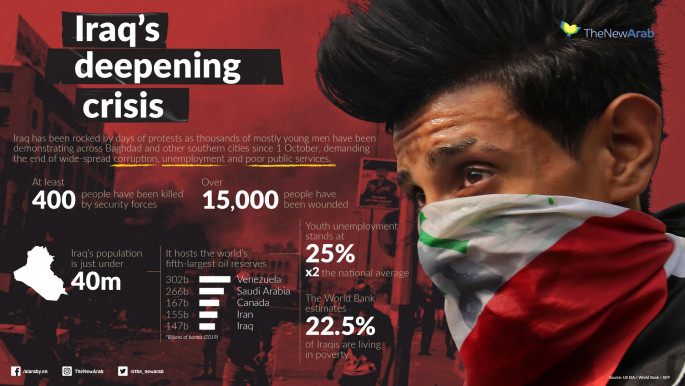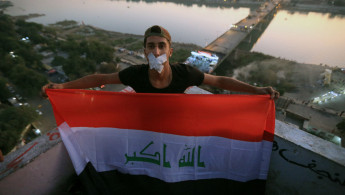Follow us on Twitter and Instagram to stay connected
Iraq protests resume as political paralysis deepens
Anti-government demonstrators burned tyres in major cities across the south, forcing the closure of schools and government buildings, AFP correspondents reported as political paralysis deepened in Baghdad.
Negotiations over a candidate to replace premier Adel Abdel Mahdi, who quit in November in the face of protests against corruption and unemployment, remained deadlocked as a midnight Sunday deadline expired.
While a pro-Iran camp has tried to impose a candidate, Iraqi President Barham Saleh has reportedly put up resistance.
Demonstrators announced civil disobedience campaigns in the southern cities of Diwaniyah, Nasiriyah, Hilla, Kut and Amara, closing public buildings and blocking roads "on orders of the people".
"We are upping our actions because we oppose any candidate from the political class that has been robbing us since 2003," said Ali al-Diwani, a young protester in Diwaniyah.
Comment: Kidnappings, killings and threats: Inside Iraq's authoritarian turn
For Iraqis protesting since October 1, the system installed by the United States after it led a military coalition to overthrow dictator Saddam Hussein in 2003 has become dominated by Iran and is beyond reform.
An economic revival promised for 16 years never came, protesters say, while more than half of all oil revenues were syphoned off by crooked politicians and their cronies.
Rallies have continued despite a campaign of intimidation that has included targeted killings and abductions of activists, which the United Nations blames on militias.
'Competent & independent'
While renewed protests risk a resumption of the violence that has already caused some 460 deaths and 25,000 injuries since October, the government remains paralysed.
Officials say Iran wants to install Qusay al-Suhail, who served as higher education minister in the government of Abdel Mahdi.
A former key member of Shiite cleric Moqtada Sadr's movement, Suhail rejoined the State of Law Alliance of former premier Nuri al-Maliki, who is close to Iran and an enemy of Sadr.
While pro-Iran factions and parliament speaker Mohammed al-Halbusi are pushing for Suhail, a source in the presidency says Saleh has vetoed his proposed appointment.
Demonstrators categorically reject Suhail's candidacy and that of anyone from the wider political establishment.
"What we want is simple: a prime minister who is competent and independent, who has never been involved with the ruling parties since 2003," said Mohammed Rahman, a protesting engineer in Diwaniyah.
Protesters say an overhaul of the political system must start with electoral reform.
Since 2003, a complicated mix of proportional representation and candidate lists has favoured major parties and the heads of those lists.
Protesters say they want a first-past-the-post system to "guarantee a new generation could enter politics to clean up everything the ruling parties have corrupted," Rahman told AFP.
Parliament has recently discussed electoral reform and was scheduled to resume talks Monday afternoon.
Lawmakers were also likely to continue negotiations to appoint a premier, the deadline for which had already been pushed back twice by Saleh before Sunday's expired.
 |





 Follow the Middle East's top stories in English at The New Arab on Google News
Follow the Middle East's top stories in English at The New Arab on Google News
![The UAE is widely suspected of arming the RSF militia [Getty]](/sites/default/files/styles/image_330x185/public/2024-11/GettyImages-472529908.jpg?h=69f2b9d0&itok=Yauw3YTG)
![Netanyahu furiously denounced the ICC [Getty]](/sites/default/files/styles/image_330x185/public/2024-11/GettyImages-2169352575.jpg?h=199d8c1f&itok=-vRiruf5)
![Both Hamas and the Palestinian Authority welcomed the ICC arrest warrants [Getty]](/sites/default/files/styles/image_330x185/public/2024-11/GettyImages-2178351173.jpg?h=199d8c1f&itok=TV858iVg)